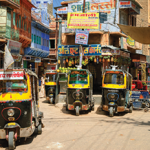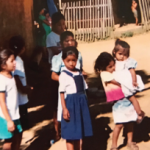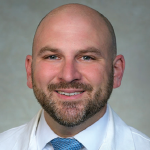Daily Life
On the bus rides back to Teleman, my mind would wander as I looked out the window at the marvelous scenery, with feelings of contentment after caring for appreciative patients. These feelings were mixed with the overwhelming paradox of the impoverished lifestyles of all the Mayan people. There is no middle class here, just those who have and—mostly—those who have not.
Being in the present with these people and this community gave me great insight into the many blessings in my life. These Mayan people are experts at daily living. Their clear priorities are caring for family, preparing the next meal, washing clothes, sheltering from the sun and rain, staying healthy and praying faithfully. Their modest lifestyle was replete with humble joy.
After eating dinner each night, I walked a mile to my host home, arriving by 8 p.m. As crazy as it sounds, I looked forward to my cold shower after traveling in dust, working in a poorly ventilated clinic and organizing medical supplies for the next day. My bedroom had a low ceiling by the shared bathroom. At times, I could overhear others sighing or deeply murmuring under the cold water for a quick rinse or a fast dance. By the end of the week, I had mastered my strategy to get cold water clean and free of insect repellent, at least for overnight. Once under the bed’s mosquito net and with ear plugs in place, to avoid hearing roosters and ducks all night, I consistently dosed off in spite of my good intentions to read.
Last Call
Our last day of clinic was profoundly busy. The community knew we were leaving the following day, so many last-minute patients stood in line, and others were carried into clinic. A very rigid Parkinson’s patient arrived. Without carbidopa/levodopa, we could only compassionately help, providing some training in activities of daily living and coordinate a referral to a neurologist via a community resource person.
One woman, a middle-aged amputee, was carried into morning clinic with a broken manual wheelchair; ultimately, she was trained that day to successfully use a walker and plans were developed for her to obtain a replacement wheelchair. Another elderly man was treated for a severe urinary tract infection and was driven home with plenty of antibiotics.
By the end of the day, we were running short on medications for hypertension and diabetes—a sign that our mission trip was coming to an end. We were able to focus on caring for the poorest of the poor and benefit from being with them in the present moment(s).
It was not until our last dinner together that I suddenly became speechless when asked to comment on what was special for me during this mission trip. After gathering my emotions, I explained my most unanticipated surprise was being immersed with a medical team that had limitless compassion and shared values. Everyone provided the best for the patients and for each other in the spirit of do no harm and living by the golden rule. Words cannot describe my feeling of gratitude.
At the Guatemala City airport the following morning, we discovered Guatemala had confirmed its first diagnosed case of coronavirus on March 15. All of our cell phones were now buzzing with COVID-19 update texts and emails from back home. Our flight was the last flight out of Guatemala back to the U.S.
My true peace in Guatemala had come to an end.



